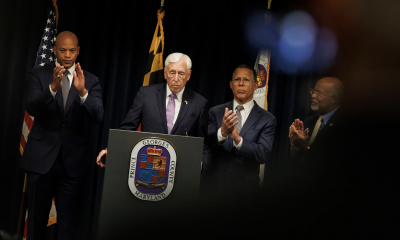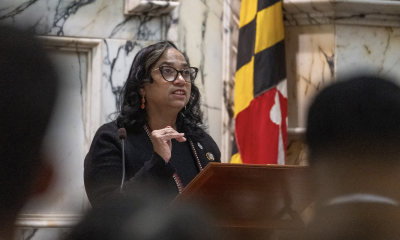Arts & Entertainment
Mommie dearest?
‘Beauty Queen’ explores kitchen sink dysfunction drama
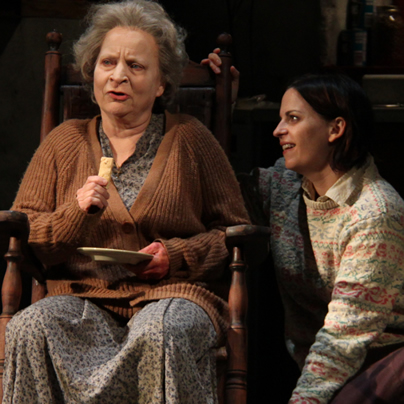
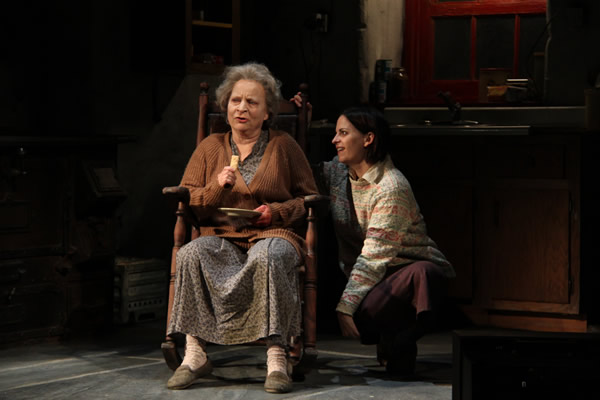
Sarah Marshall, left, as Mag, and Kimberly Gilbert as Maureen in ‘The Beauty Queen of Leenane.’ (Photo by Danisha Crosby; courtesy Round House Theatre)
‘The Beauty Queen of Leenane’
Through Sept. 15
Round House Theatre
4545 East-West Highway
Bethesda, Md.
$35-$50
240-644-1100
roundhousetheatre.org
Anglo-Irish playwright Martin McDonagh has either seen some very scary stuff or has a darkly wild imagination. Let’s hope it’s the latter. In his intense, 1996 black comedy “The Beauty Queen of Leenane,” the relationship between old Mag Folan and caretaker/daughter Maureen makes the sisters’ bond in “Whatever Happened to Baby Jane?” look downright cozy.
Now playing at Round House Theatre in Bethesda, “Beauty Queen” (the first of McDonagh’s trilogy set in Leenane, a tiny hamlet on the west coast of Ireland) is rife with horror and laughs. Lucky for us, the production is helmed by director Jeremy Skidmore who leads a top-notch cast in plumbing the tragicomedy’s many facets, ensuring what could be an over-the-top grand guignol is something all too fathomable.
At 40, Maureen (Kimberly Gilbert) is a virgin who’s never been in a relationship. Her days are spent waiting on her demanding mother Mag (Sarah Marshall) in their isolated stone cottage. It’s a tedious and lonely existence, but mother and daughter pass the time playing games — mind games of the sick and twisted variety. For the pair, life is an unending power struggle. Now and then Maureen gets out, usually for food shopping, but always her prison-like situation is waiting.
Maureen’s possible salvation appears in the form of neighbor Pato Dooley (Todd Scofield). He’s home on a visit from his construction job in England when he and Maureen get together for a night of boozy amour. But naturally controlling mama Mag isn’t having it, and her evil determination to quash the budding romance kicks off a string of sneaky betrayals and terrifying retributions.
As mother and daughter, Marshall and Gilbert are superb. Marshall, who is gay, nails Mag’s many moods: infantile, charming, diabolical and palpably rotten (whatever it takes to finagle her own way). As Maureen, Gilbert wonderfully displays a range of toughness and vulnerability. Scofield gives a solidly touching performance as the thoroughly decent Pato, a plain laborer who definitely is in over his head with these crazy Folan women. And Joe Mallon is appropriately obnoxious as Ray, Pato’s younger brother.
McDonagh is a masterful storyteller. He draws us in slowly. Initially it seems Mag is your garden variety spoiled old woman with a bad hip who likes her tea hot and porridge without lumps, and that Maureen is the harassed skivvy with a sharp tongue — her every chore is performed with a string of hilarious threats and profanities. But as the play unfolds, it becomes clear that this less-than-functional household isn’t simply the result of a mother and daughter spending too much time together. While her two sisters eluded Mag’s grasp via marriage, Maureen, with a history of breakdowns, remained at home as her mother’s sole caretaker, not an enviable role under the best of circumstances.
Kudos to the actors and dialect coach Leigh Wilson Smiley: the Irish accents are thick and consistent (and to me, sound authentic). For the first five or so minutes of the play, in fact, I panicked. What are they saying? But with a little concentration and settling into the rhythm of the talk, all was soon well. Mag and Maureen talk a lot about Complan, Kimberleys (a powdered supplement and cookies), and make myriad other alien references, so prior to curtain it helps to peruse the glossary provided in the program.
Though a lot of action takes place offstage, the entire play is set in the cottage’s shabby kitchen designed by Tony Cisek. With its ancient wood stove, dwarf fridge and stinky sink (that doubles as a loo for Mag), it’s easy to get a sense of Maureen’s unenviable workaday life. Though not small, the room is claustrophobic — ripe for explosion.
The play’s title becomes a sweet in-joke shared between Maureen and Pato, happily and then sadly evoking what they briefly had and even more so what might have been. “Beauty Queen” is a play that affects long after the lights go black.
Movies
‘Hedda’ brings queer visibility to Golden Globes
Tessa Thompson up for Best Actress for new take on Ibsen classic

The 83rd annual Golden Globes awards are set for Sunday (CBS, 8 p.m. EST). One of the many bright spots this awards season is “Hedda,” a unique LGBTQ version of the classic Henrik Ibsen story, “Hedda Gabler,” starring powerhouses Nina Hoss, Tessa Thompson and Imogen Poots. A modern reinterpretation of a timeless story, the film and its cast have already received several nominations this awards season, including a Globes nod for Best Actress for Thompson.
Writer/director Nia DaCosta was fascinated by Ibsen’s play and the enigmatic character of the deeply complex Hedda, who in the original, is stuck in a marriage she doesn’t want, and still is drawn to her former lover, Eilert.
But in DaCosta’s adaptation, there’s a fundamental difference: Eilert is being played by Hoss, and is now named Eileen.
“That name change adds this element of queerness to the story as well,” said DaCosta at a recent Golden Globes press event. “And although some people read the original play as Hedda being queer, which I find interesting, which I didn’t necessarily…it was a side effect in my movie that everyone was queer once I changed Eilert to a woman.”
She added: “But it still, for me, stayed true to the original because I was staying true to all the themes and the feelings and the sort of muckiness that I love so much about the original work.”
Thompson, who is bisexual, enjoyed playing this new version of Hedda, noting that the queer love storyline gave the film “a whole lot of knockoff effects.”
“But I think more than that, I think fundamentally something that it does is give Hedda a real foil. Another woman who’s in the world who’s making very different choices. And I think this is a film that wants to explore that piece more than Ibsen’s.”
DaCosta making it a queer story “made that kind of jump off the page and get under my skin in a way that felt really immediate,” Thompson acknowledged.
“It wants to explore sort of pathways to personhood and gaining sort of agency over one’s life. In the original piece, you have Hedda saying, ‘for once, I want to be in control of a man’s destiny,’” said Thompson.
“And I think in our piece, you see a woman struggling with trying to be in control of her own. And I thought that sort of mind, what is in the original material, but made it just, for me, make sense as a modern woman now.”
It is because of Hedda’s jealousy and envy of Eileen and her new girlfriend (Poots) that we see the character make impulsive moves.
“I think to a modern sensibility, the idea of a woman being quite jealous of another woman and acting out on that is really something that there’s not a lot of patience or grace for that in the world that we live in now,” said Thompson.
“Which I appreciate. But I do think there is something really generative. What I discovered with playing Hedda is, if it’s not left unchecked, there’s something very generative about feelings like envy and jealousy, because they point us in the direction of self. They help us understand the kind of lives that we want to live.”
Hoss actually played Hedda on stage in Berlin for several years previously.
“When I read the script, I was so surprised and mesmerized by what this decision did that there’s an Eileen instead of an Ejlert Lovborg,” said Hoss. “I was so drawn to this woman immediately.”
The deep love that is still there between Hedda and Eileen was immediately evident, as soon as the characters meet onscreen.
“If she is able to have this emotion with Eileen’s eyes, I think she isn’t yet because she doesn’t want to be vulnerable,” said Hoss. “So she doesn’t allow herself to feel that because then she could get hurt. And that’s something Eileen never got through to. So that’s the deep sadness within Eileen that she couldn’t make her feel the love, but at least these two when they meet, you feel like, ‘Oh my God, it’s not yet done with those two.’’’
Onscreen and offscreen, Thompson and Hoss loved working with each other.
“She did such great, strong choices…I looked at her transforming, which was somewhat mesmerizing, and she was really dangerous,” Hoss enthused. “It’s like when she was Hedda, I was a little bit like, but on the other hand, of course, fascinated. And that’s the thing that these humans have that are slightly dangerous. They’re also very fascinating.”
Hoss said that’s what drew Eileen to Hedda.
“I think both women want to change each other, but actually how they are is what attracts them to each other. And they’re very complimentary in that sense. So they would make up a great couple, I would believe. But the way they are right now, they’re just not good for each other. So in a way, that’s what we were talking about. I think we thought, ‘well, the background story must have been something like a chaotic, wonderful, just exploring for the first time, being in love, being out of society, doing something slightly dangerous, hidden, and then not so hidden because they would enter the Bohemian world where it was kind of okay to be queer and to celebrate yourself and to explore it.’”
But up to a certain point, because Eileen started working and was really after, ‘This is what I want to do. I want to publish, I want to become someone in the academic world,’” noted Hoss.
Poots has had her hands full playing Eileen’s love interest as she also starred in the complicated drama, “The Chronology of Water” (based on the memoir by Lydia Yuknavitch and directed by queer actress Kristen Stewart).
“Because the character in ‘Hedda’ is the only person in that triptych of women who’s acting on her impulses, despite the fact she’s incredibly, seemingly fragile, she’s the only one who has the ability to move through cowardice,” Poots acknowledged. “And that’s an interesting thing.”
Arts & Entertainment
2026 Most Eligible LGBTQ Singles nominations
We are looking for the most eligible LGBTQ singles in the Washington, D.C. region.

Are you or a friend looking to find a little love in 2026? We are looking for the most eligible LGBTQ singles in the Washington, D.C. region. Nominate you or your friends until January 23rd using the form below or by clicking HERE.
Our most eligible singles will be announced online in February. View our 2025 singles HERE.
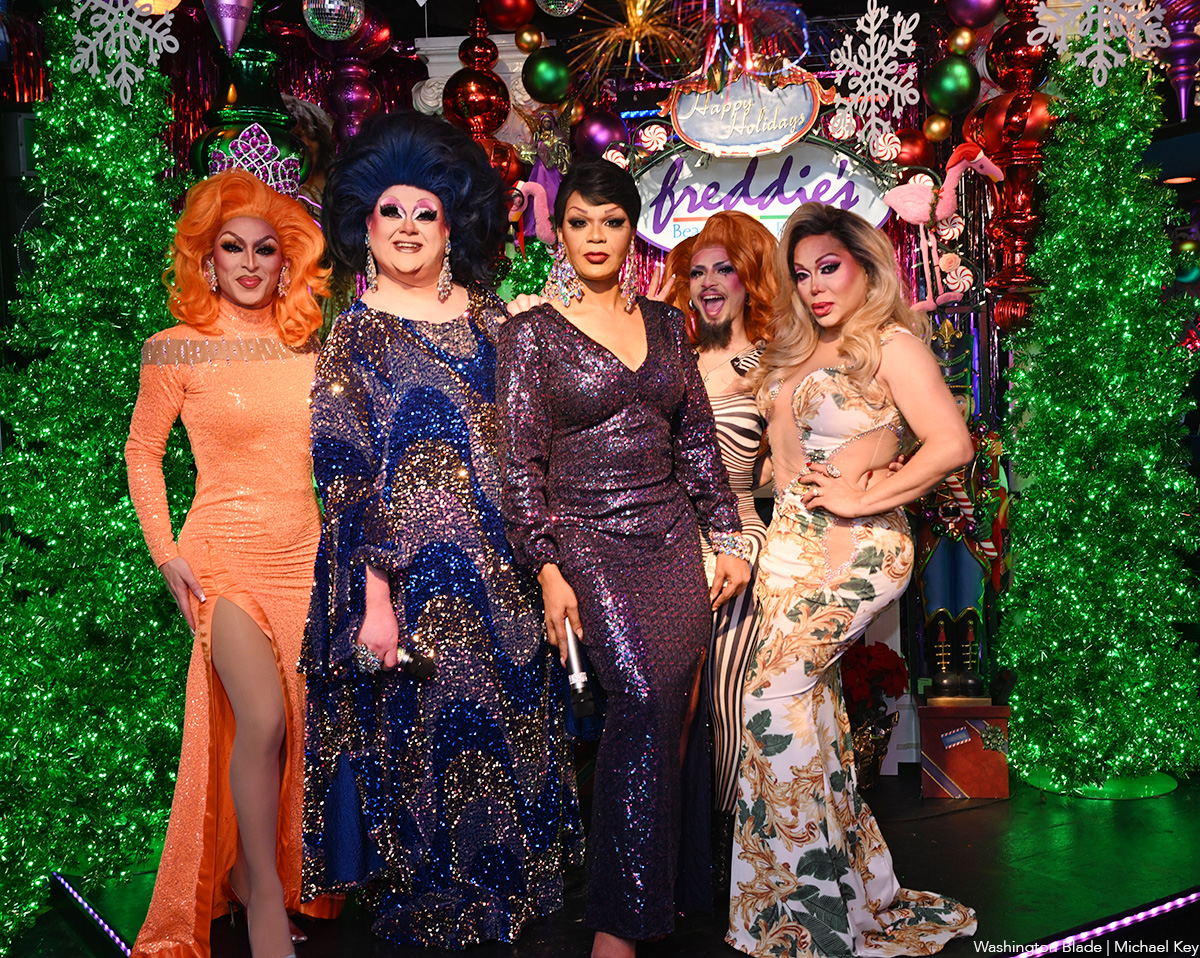
The Freddie’s Follies drag show was held at Freddie’s Beach Bar in Arlington, Va. on Saturday, Jan. 3. Performers included Monet Dupree, Michelle Livigne, Shirley Naytch, Gigi Paris Couture and Shenandoah.
(Washington Blade photos by Michael Key)

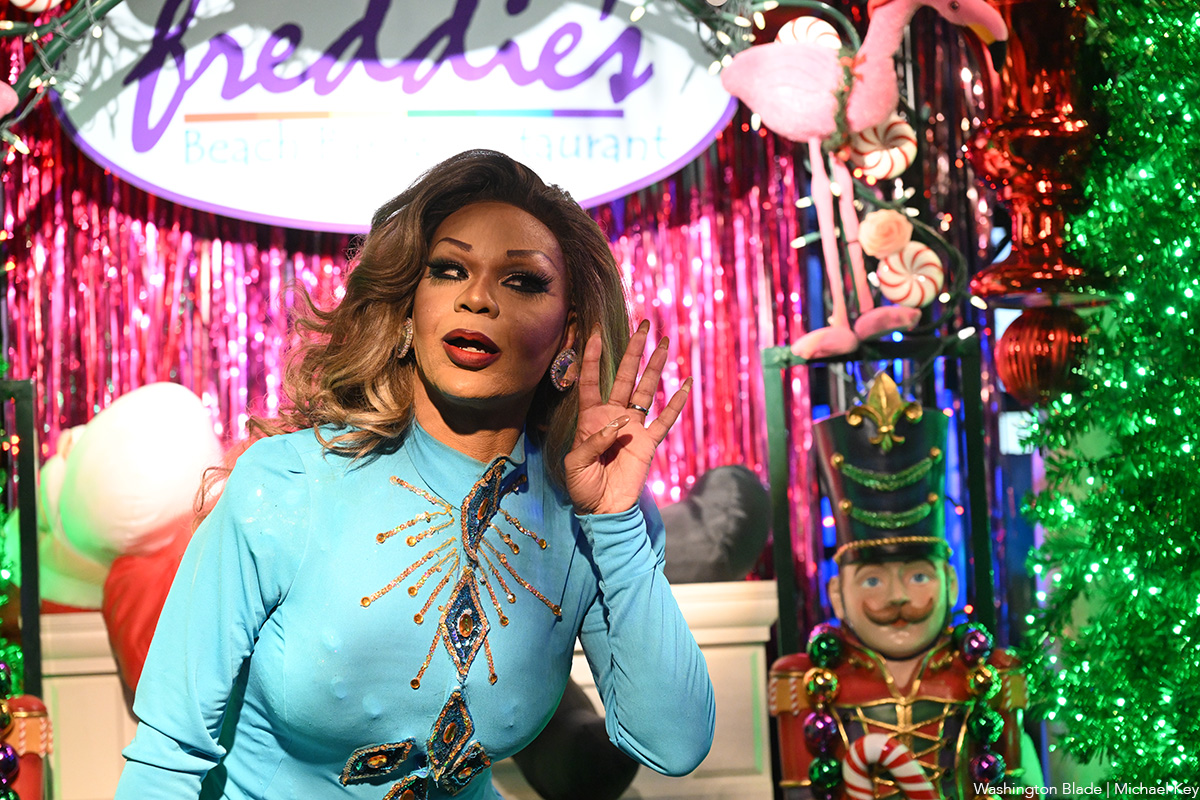





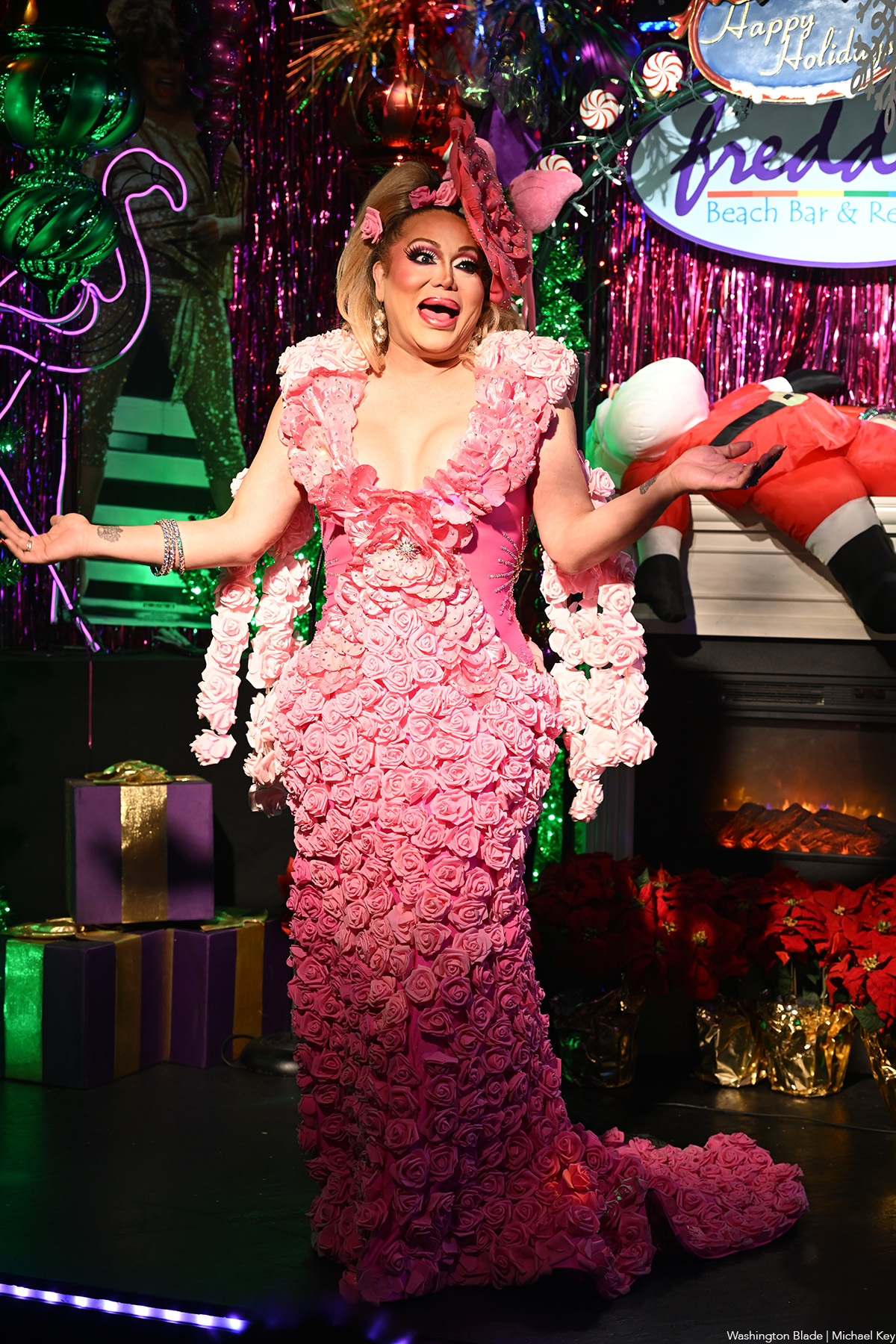
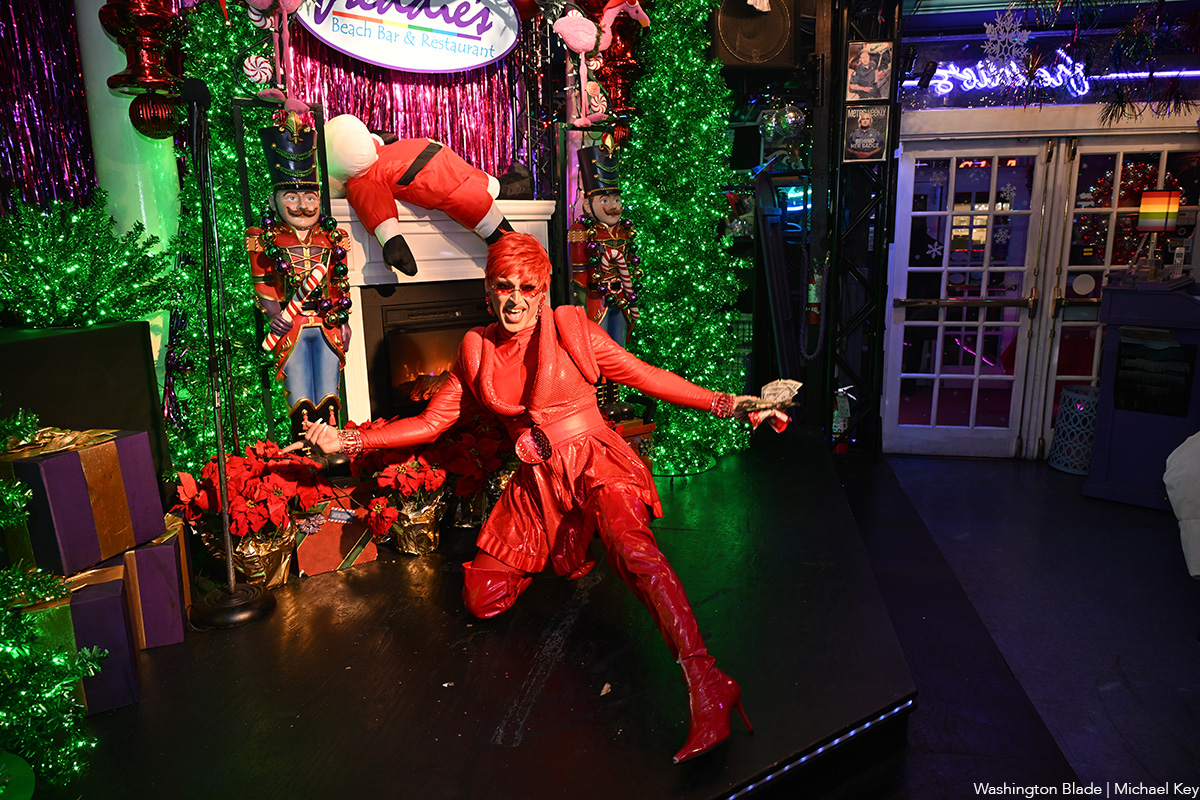
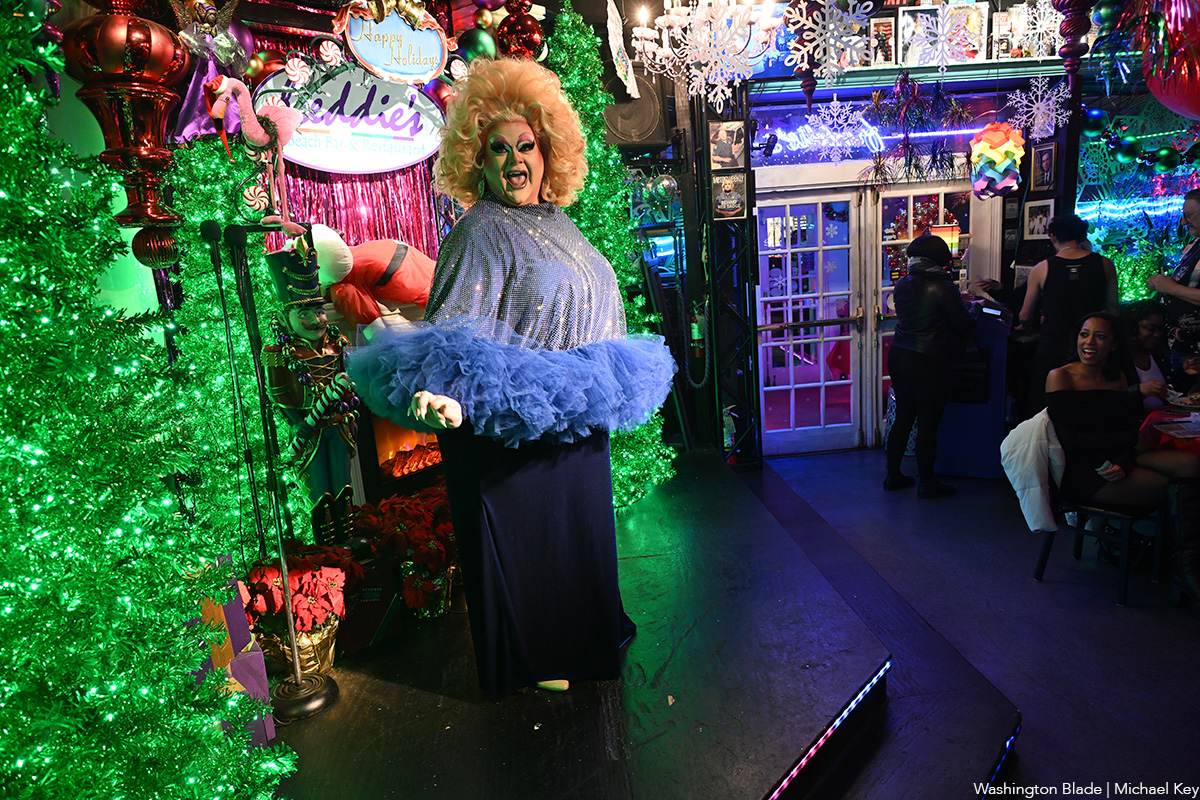
-

 Sponsored5 days ago
Sponsored5 days agoSafer Ways to Pay for Online Performances and Queer Events
-

 District of Columbia4 days ago
District of Columbia4 days agoTwo pioneering gay journalists to speak at Thursday event
-

 Colombia3 days ago
Colombia3 days agoBlade travels to Colombia after U.S. forces seize Maduro in Venezuela
-

 a&e features4 days ago
a&e features4 days agoQueer highlights of the 2026 Critics Choice Awards: Aunt Gladys, that ‘Heated Rivalry’ shoutout and more

